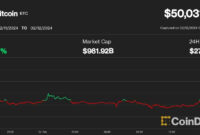What Coinbase International Exchange Means for U.S. Investors – cryptokinews.com
Coinbase has launched a new derivatives exchange in Bermuda, a totemic act showing the largest U.S. crypto exchange means business when it says U.S. crypto regulations are increasingly nonviable. The exchange, which has been publicly feuding with the U.S. Securities and Exchange Commission (SEC) over a range of issues, received its license to operate in the island nation last month as it looks to test the international waters.
Founded by CEO Brian Armstrong in 2012, Coinbase has grown to become the second-largest crypto exchange – trailing only the HQ-less Binance – by trading volume, largely by working closely with U.S. regulators. Its IPO in 2021 came at the end of a lengthy diligence process with the SEC, leading many to think that the agency had endorsed its business model. But over the past couple of years, under Gary Gensler’s regime as chairman of the SEC, the company has found itself at an impasse with the regulator.
Coinbase Global is rolling out a new product for professional investors outside of the U.S.
Why it matters: It’s a stab at international markets, amid a broader exodus from the country for crypto exchanges and services.
Coinbase and the SEC
Coinbase is one of the largest crypto exchanges based in the U.S. Armstrong says this was a deliberate decision because he believes America should be at the front of this nascent industry. However, his views may be changing. He warned in a recent op-ed for CNBC that the “U.S. risks falling behind both technologically and politically.”
This year, we’ve seen several moves by the Securities and Exchange Commission (SEC) against crypto platforms, and there’s still a lot of confusion about whether crypto comes under its jurisdiction or that of the Commodity Futures Trading Commission (CFTC). Right now, most cryptos are treated as commodities. But the SEC argues that many cryptocurrencies are in fact securities that should come under its remit. There are strict rules on how securities share information and are traded that do not apply to commodities.
Last year, the SEC stopped Coinbase from launching a lend-earn product. It also charged two former Coinbase employees with insider trading violations. Most recently, it slapped Coinbase with a Wells notice over potential securities violations. This is essentially a warning that it plans to take enforcement action against it. In a rebuttal, Coinbase insisted it, “Does not list securities or offer products to our customers that are securities.”
In addition to volatility, the relative lack of regulation is one of the big risks of investing in cryptocurrency. As we saw with the collapse of FTX, there isn’t a lot of investor protection and there’s a lack of transparency about what some of these platforms are doing with customer funds. The challenge is that the industry grew dramatically in an environment with relatively few rules. Now regulators are trying to reverse-engineer stricter controls. Unfortunately, it’s a bit like shutting the gate after the horse has bolted.
The Coinbase International Exchange
The new Coinbase International Exchange has regulatory approval from the Bermuda Monetary Authority. It will only be available to institutional investors in certain non-U.S. countries.
It will allow qualified investors to trade perpetual crypto futures, which is a type of derivative trading. Essentially, derivatives let investors speculate on the future price of a commodity – in this case, Bitcoin (BTC) and Ethereum (ETH). Unlike traditional futures contracts, perpetual futures don’t have an expiration date, meaning traders can keep their positions open for longer.
The new exchange will also offer up to five times leverage. Leverage lets investors multiply both their gains and their losses by essentially trading with borrowed funds. Leverage and derivatives trading can be extremely risky, particularly for a volatile asset class such as crypto.
In a press release, Coinbase said, “Perpetual futures accounted for nearly 75% of global crypto trading volume in 2022, creating highly-liquid markets and offering traders additional versatility in their trading strategies.”
What it means for U.S. investors
The new exchange is not available in the U.S. where crypto derivatives are tightly restricted, especially for retail investors. As such, the service will have little direct impact on U.S. investors. However, what could affect American crypto investors is Coinbase’s more international focus — especially when taken alongside Armstrong’s comments about possible relocation.
For U.S. crypto investors, the issue of regulation is key. In the absence of clear guidelines, Coinbase says this country has a “regulation by enforcement approach.” It says that the SEC is punishing the crypto industry for breaking rules that have not been clearly communicated. “Coinbase and other crypto companies are facing potential regulatory enforcement actions from the SEC, even though we have not been told how the SEC believes the law applies to our business,” it argues.
In the long term, increased regulation could strengthen the foundations of the industry and build much needed trust. But in the short term, it could lead to even more volatility and may cause crypto companies to move to other countries. This could have a knock-on effect for how digital currencies evolve in America and how investors can buy or sell cryptocurrencies. As an investor, pay attention to both industry and regulatory moves, as both could impact your portfolio.


